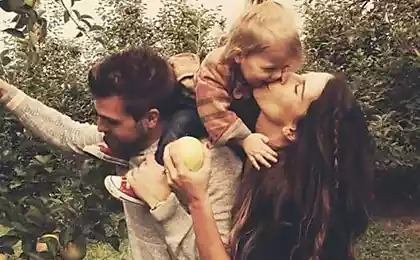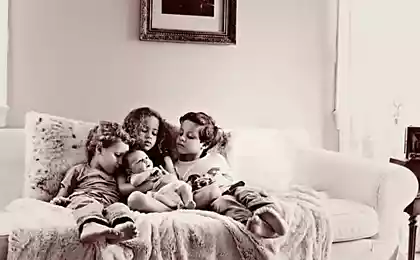1014
Why such different children are in the same family
"Why did both children in our family are so different? After all, they grow in the same family, and we brought them equally. The first - a serious, conscientious, good student, and the second only to mischief
mind. " This question is often heard at meetings with parents, I have to answer another question: "Yes, you are living in the same household. But is it true that you and your children live in the same family? For example, I believe the opposite. »
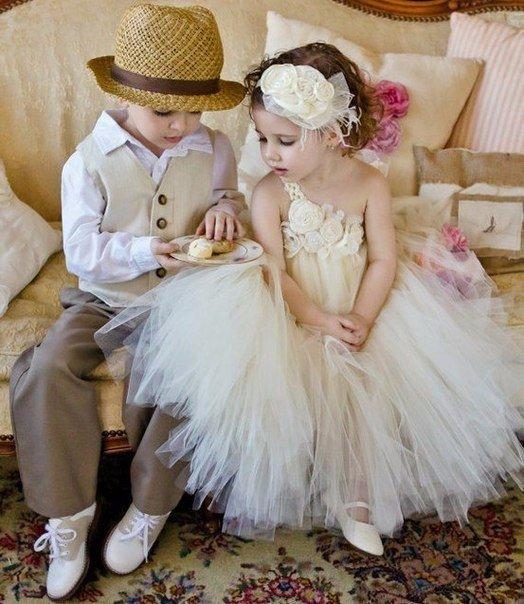
Your first child came into the world, met with mom and dad, and a certain time was the only child.
Your second child has never been an only child and always lived in a family where, apart from him, and the parents had another child.
Firstborn - always the first-born. He received more love, attention and more experienced the effects of anxiety of parents felt the inconsistency of their relationship. He experienced the bitterness of "dethronement" after the appearance of a second child. Junior appeared in a more relaxed atmosphere, but came into the world, met not only with parents but also with its predecessor. However, all this we must add another equally important factor that manifests itself in the structure of interpersonal family relationships.
Firstborn first "probes" found "weaknesses" of parents and adapts to them. He finds unique ways of behavior in the family, by which feels its importance, receives the necessary attention to parents. For example, the firstborn feels that parents' attention due to the fact some new skills he learned, what new has learned that the love of parents depends on how much he helps at home, how able to stick to the order, and so on. D. In other words, the elder assumes the role of "little
assistant. " Second child after infancy (the unconditional love of a mother) gets in a situation of choice of means, what it can achieve the love and attention of parents. Unlike older, which is all the way, the baby is in a difficult situation were opened. If it will build their relationship with their parents for the older model, in our case - to strive for as an assistant, then he is likely to remain "in the shadows" senior
. Often, younger children, and trying to act like the older, but the attitude of parents towards their still clumsy attempts is different and depends on the further selection. Encourage even attempt to act as an older brother or sister - is rare enough, although only this attitude can promote the adoption of junior indoor installation similar to the installation older
. Then, under favorable conditions, we are seeing other family co-operation, that is, brothers, are not in competition with each other, seek, for example, as much as possible to help parents take on some chores, or together form the backbone of the football team of the yard. However, the opposite is more often observed.
Trying for a baby to follow the older, first course ridiculous, clumsy, funny, cause an indulgent smile adults, initially serves as a model, and then, such attempts have been neglected. Following a senior, he often takes his toddler weakness, insignificance, in other words, gets "in the shadow" of the older, still behind him.
The kid can rush "after" for seniors, with great zeal to cultivate the ability to complete the competition and hoping to someday be better than him, stronger than in any significant respect. Yet children are more likely to choose a more easy and simple way - to find its own, individual way of feeling the importance of the family, getting the attention and love of parents
. The situation of a second child can be metaphorically represented as a circuit-pattern (Fig. 1).
Figure 1.
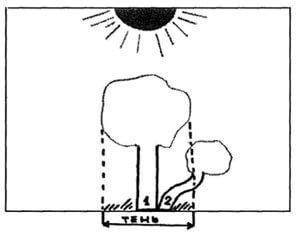
In this figure, the sun - a prototype of the ancient symbol of prosperity - depicts parental love and attention. The first child (tree number 1) finds its' way to the sun "- certain methods for the preparation of love, encouragement of parents (for example, assumes the role of little helper, baby role, constantly in need of supervision, etc...)
In other words, he seems to reserve the specific shade; if the second will behave in the same way as the first, then, being younger, not having enough life experience, it will remain in this respect weaker, will "always second". And it is perceived by the child as damage to the sense of its importance, moreover, being less than perfect in certain forms of behavior than the older child, he may actually notice that he gets less praise, good-natured attention of parents, and instead of constantly need to follow the example of chemu-to .
Second child, like a real tree in the presented picture, we have to look for their own way to come out of the "shadow", through to "sun" - that is "sound out" those behaviors that would ensure his parental attention, perception and love as individual, with no one comparable to humans. An example of the logic of development of the personality of the second child is the following example.
The first child - a boy of seven, obedient, docile. He seeks to learn new skills, knowledge, especially in those areas that seem important to his parents. In the first days of school with only learns very well that delights parents. He says his mother, a serious, disciplined, it can be relied upon. The second boy, younger than two years, - "living silver" (similarity of mercury). He is restless, he had in mind only the different tricks, jokes, can do nothing to seriously address, it would only be fooling around.
On closer acquaintance with the family you would certainly see the reasons for such a different personality development of children. The second child so their development is required, first, to his creative attitude to the environment, and secondly, the method of conduct of the first child and, thirdly, the personal characteristics of their parents. His mother, speaking of the second, the "problem" child, talking about his antics, still can not help but smile. Why?
The second child, unconsciously adopting the role of the clown in the family, his directness, playful, unconventional behavior brought what we need, and parents, and the whole family - emotional. And he found it, not based on some knowledge, and so sverhchute. D.
Everything is much easier - as soon as he began to behave in a different way than his brother, and just the way he is behaving now, he felt the attention to themselves, to their individual manifestations, and, finally, smile and disinhibition in the behavior of parents. Figuratively speaking, he got out of the "shadow" of his brother, found a way to to feel its importance, not competing with them.
Senior communicates with parents on the "senior level" - shares his ideas, asks them, etc. The second -.. At the children, direct, emotional level. Each of them fills a certain "ecological niche" in the family to give the necessary "mental food" - a sense of meaning, love and attention of parents to them as an individual and autonomous people. It contributes to the development of friendly and tolerant relations between the brothers: two brothers perfectly communicate with each other: the youngest - a constant inventor, a generator of ideas, and the senior - the intelligent controller, the implementer, head
. Is it good or bad that children choose such different behavior? The issue is complex, and clearly answer it is probably impossible. In the case described how the brothers would complement each other, making the life of the whole family a varied, complete. Still, the second child and causing some concern: whether it be a decent person can
? Surely, if the emotional connection with parents hold him, do not worry about it, although it is obvious that it will be a completely different person than his brother. Look at the difference between them can be in terms of the philosophy of everyday consciousness: all the people in their own way beautiful and valuable. How boring the world would be if it lived the same person.
However, there is not only such a philosophy of life, but also the scientific arguments in favor of that tolerance, somewhat condescending attitude to the ways of personal development is one of the important factors of mental health of the developing human.
In psychology has accumulated a lot of facts that unreasonable desire to "make the child something", "reshape" his often fantastic views of parents, that is intolerant of individual, creative (in the broadest sense) manifestations of the child, as a rule, leads to disastrous results:. distorted relationships to others and themselves, protest, negativity, and often to mental disorders
In some families thrive monotonous, often unfounded rigid idea of how to behave as a child, how to be and even who to be ... twenty years later! Of course, such a set of rules placed a heavy burden on the development of each child in the family, but this is a separate issue. Let us confine ourselves to the situation of the second child, which in this case falls into a very difficult position. It also may be figuratively represented as a circuit-pattern (Fig. 2).
Figure 2.
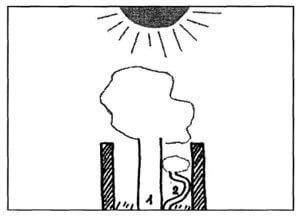
It differs from Figure 1 that parental demands put very strict limits possible behavior of the child. Firstborn quickly recognize them and if they are not too inconsistent with his psychological needs, adapting to them.
Psychological space, or "parent sunlight", is completely obscured by the second, the barriers surround it on all four sides. The desire of the second "break into the world" is constantly blocked by the limitations of parents and indirectly -. Elected by the first-born of
The second is to choose the path of following the elders and somehow exist in its "shadow". In this case, he constantly loses parental love and attention as a standalone, unique creature. It hurts his self-esteem, a sense of self-worth. Like a real tree growing in such conditions remains stunted and underdeveloped, and child in this position in the personal plan does not produce a vitality. However, such conditions of development can not at least occasionally not cause the protest, the search out of the situation. In this situation, the decision can be seen, at least three strategies.
The first strategy. The second child early begins to perceive older as an obstacle standing between him and his parents. This leads to a competitive relationship with him and begins to manifest itself in a feeling of envy, desire to humiliate the older parents in the eyes, yabednichestve, excessive boasting with a view to artificially increase its value.
This behavior is dictated by a distorted syllogism: "I will be valuable and loved when surpass older, and all means are good to achieve this goal." Senior, as a rule, quickly picks up "foul play" junior (yabednichestvo, bragging, cheating), and for its part it is punishing the kid for their own means, or humiliates, discredits it in the eyes of parents.
That, in turn, directly or trying to "overcome" the older or more fiercely resorting to "forbidden" methods, for example, is trying to defame senior, doing something illicit and lays the blame on the older. This again inflates older. And so on.
Thus a vicious circle in which all growing competitive, extremely tense relations that, as a rule, leads to a variety of severe violations (especially in young children), to the long-term enmity, hatred between brothers. Probably, you had to deal with seemingly inexplicable appearance hostility between the already older sisters, brothers, and be stunned by it. In eight cases out of ten - it echoes of children's battles. This situation is just figuratively and is shown in Fig. 3.
Figure 3.
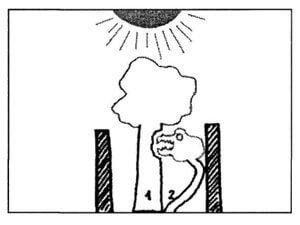
The second strategy. The child directs his energy not on competition with his brother, and the break-up of parental restrictions (Fig. 4). Inner position in this case as it directs the child's behavior at the same time against their parents and to seek contact with them: "I will make you to reckon with me for who I am»
. Although the desperate desire of the child to deal with the limitations of parents expresses the perceived irrelevance, rejection, emotional coldness, it is very rarely seen parents that way. Often - as a manifestation of "badness", as a result of the inadequate education, etc. razbalovannosti
.. Thus, the desire of the child to break through the limitation occurs with an increase in restrictions on the part of the parents, with their tightening. It creates a vicious circle:.. A protest against restrictions - tightening restrictions - a strong protest, etc. With age, the child's protest reactions are getting stronger
. At the end of primary school, especially in adolescence, a considerable part of the offense is committed as a kind of protest against the family situation as an illusory means of its decision.
Figure 4.
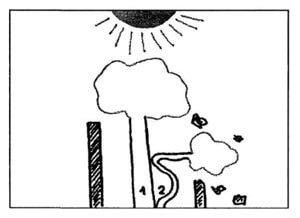
The third strategy. It is presented in Fig. 5. Wood, instead of rising up to the sun, turn back to the land. I do not know whether this is really in nature, but in relation to the development of the personality is sometimes something like this happens. A child in such cases as it totally refuses to fight for themselves, losing hope to achieve feelings of self-worth and love from others.
All his behavior, he is saying to the world: "Do not you see what I'm useless? So leave me alone is! "This is a closed, neobschayuschiysya child all day, it seems, does not hold. If an adult is trying to help him, to do with him, he seems to especially show his stupidity, awkwardness. "Leave me alone" - a child's inner attitude, the psychological aspect of being in a very difficult situation
. Figure 5.
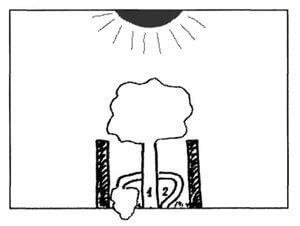
Summarizing, we can say that the development of a second child is easier and usefulness in cases where parents are sensitive to different and varied manifestations of personality, have the ability to accept and love their children for who they are. This gives children a chance to both find acceptable non-competitive position in relation to each other, maintains emotional contact between parents and children.
Such an "unconstrained" development some may even uncontrollable. In fact, efficiency is not the direct manipulation in the education system by the severe restrictions, and belief in the developing human wisdom, support it, and emotional warmth. This is the foundation to the little man himself understood the world around him, was brave enough to go on the chosen path, and at the same time that he was able to open, with affection and tenderness to look to their parents in the eye.
Analysis of family with two children will not be complete if silent about the "natural" conditions that facilitate the development of the first and second child. At first glance it seems that the family, raising children of opposite sexes, are psychologically more favorable situation.
Traditionally a very early age, boys and girls meet different requirements. In our culture, for example, boys often rewarded for initiative, courage, initiative, independence, and even aggressiveness. Traditions aim the education of boys to the vast world of social and labor relations.
From girls expect that they will grow up gentle, sincere, sensitive and responsive. They are directed to the limited scope of social action on deep and subtle understanding of human relationships, family.
Thus, the brother and sister are rarely tough conflict with each other, if their behavior is consistent with the expectations of parents. Competitive, difficult relationships in such families arise mainly because of the clear preference of the parents of the same sex. Most often it is boys, at least in the European culture. It is possible that the preference of masculine gender refers to the relics of the past feudal system, in which a boy - and the heir and successor of sorts, and the physical strength to protect the family. Whatever it was, a clear desire to have only boys (rarely girls) leads to striking intrafamilial psychological problems.
Girls growing up in a family-oriented men's values, often start to feel their own inferiority because of their gender. The quest for relevance, which is conceptualized as follows: "I will be loved and desired, if at all caught up with the boy" - leads to the adoption of male behavior, assimilation of male values. In such cases, developed and strong competition between sister and brother, moving further away from the girl "female" way of expression.
Почти в каждом дворе можно найти девочку, гоняющую вместе с мальчишками мяч, бегающую с ними наперегонки и даже одетую подобно мальчику. В сущности, эти девочки демонстрируют своеобразное приспособление к преобладающим ценностям в семье. Как правило, такое поведение не дает желаемого ощущения значимости — сколько ты ни старайся, все равно останешься девочкой. Даже несмотря на хорошо усвоенное «мальчишество», они постоянно находятся под угрозой обострения внутреннего конфликта «кто я?»: «я девочка — я мальчик».
Это противоречие дает о себе знать, как только расширяется привычное социальное окружение (новое место жительства, детский сад, школа и т. п.), когда их мальчишеское поведение вызывает недоумение и насмешку окружающих. Внутренний конфликт обостряется в пору полового созревания.
Возникает ощущение неадекватности собственного поведения, мучительное переживание неполноценности. В то же время девочка начинает смотреть на мальчиков как на что-то иное, да и отношения мальчиков к ней окрашиваются тонами первой любви, ожиданием чего-то большего, чем от простого компаньона детских игр.
Все это либо ведет молодую девушку к кардинальной перестройке привычных способов поведения и осмысления мира, либо отгораживает ее от сверстников: «я — ничто и ни с кем не могу сдружиться», либо девочка еще ярче проявляет свои мальчишеские черты, пытаясь не отстать и даже обогнать мальчишек в самых дерзких их затеях.
В последнем случае развивается маскулинная личность женщины, которой наряду с сильным, решительным отношением к жизни приходится постоянно переживать ситуацию «белой вороны» как среди женщин, так и среди мужчин. Часто такая, внешне жесткая женщина прячет за подобным обликом высокую чувствительность, ранимость и чувство отчужденности.
Источник: Г. Хоментаускас «Семья глазами ребенка
mind. " This question is often heard at meetings with parents, I have to answer another question: "Yes, you are living in the same household. But is it true that you and your children live in the same family? For example, I believe the opposite. »

Your first child came into the world, met with mom and dad, and a certain time was the only child.
Your second child has never been an only child and always lived in a family where, apart from him, and the parents had another child.
Firstborn - always the first-born. He received more love, attention and more experienced the effects of anxiety of parents felt the inconsistency of their relationship. He experienced the bitterness of "dethronement" after the appearance of a second child. Junior appeared in a more relaxed atmosphere, but came into the world, met not only with parents but also with its predecessor. However, all this we must add another equally important factor that manifests itself in the structure of interpersonal family relationships.
Firstborn first "probes" found "weaknesses" of parents and adapts to them. He finds unique ways of behavior in the family, by which feels its importance, receives the necessary attention to parents. For example, the firstborn feels that parents' attention due to the fact some new skills he learned, what new has learned that the love of parents depends on how much he helps at home, how able to stick to the order, and so on. D. In other words, the elder assumes the role of "little
assistant. " Second child after infancy (the unconditional love of a mother) gets in a situation of choice of means, what it can achieve the love and attention of parents. Unlike older, which is all the way, the baby is in a difficult situation were opened. If it will build their relationship with their parents for the older model, in our case - to strive for as an assistant, then he is likely to remain "in the shadows" senior
. Often, younger children, and trying to act like the older, but the attitude of parents towards their still clumsy attempts is different and depends on the further selection. Encourage even attempt to act as an older brother or sister - is rare enough, although only this attitude can promote the adoption of junior indoor installation similar to the installation older
. Then, under favorable conditions, we are seeing other family co-operation, that is, brothers, are not in competition with each other, seek, for example, as much as possible to help parents take on some chores, or together form the backbone of the football team of the yard. However, the opposite is more often observed.
Trying for a baby to follow the older, first course ridiculous, clumsy, funny, cause an indulgent smile adults, initially serves as a model, and then, such attempts have been neglected. Following a senior, he often takes his toddler weakness, insignificance, in other words, gets "in the shadow" of the older, still behind him.
The kid can rush "after" for seniors, with great zeal to cultivate the ability to complete the competition and hoping to someday be better than him, stronger than in any significant respect. Yet children are more likely to choose a more easy and simple way - to find its own, individual way of feeling the importance of the family, getting the attention and love of parents
. The situation of a second child can be metaphorically represented as a circuit-pattern (Fig. 1).
Figure 1.

In this figure, the sun - a prototype of the ancient symbol of prosperity - depicts parental love and attention. The first child (tree number 1) finds its' way to the sun "- certain methods for the preparation of love, encouragement of parents (for example, assumes the role of little helper, baby role, constantly in need of supervision, etc...)
In other words, he seems to reserve the specific shade; if the second will behave in the same way as the first, then, being younger, not having enough life experience, it will remain in this respect weaker, will "always second". And it is perceived by the child as damage to the sense of its importance, moreover, being less than perfect in certain forms of behavior than the older child, he may actually notice that he gets less praise, good-natured attention of parents, and instead of constantly need to follow the example of chemu-to .
Second child, like a real tree in the presented picture, we have to look for their own way to come out of the "shadow", through to "sun" - that is "sound out" those behaviors that would ensure his parental attention, perception and love as individual, with no one comparable to humans. An example of the logic of development of the personality of the second child is the following example.
The first child - a boy of seven, obedient, docile. He seeks to learn new skills, knowledge, especially in those areas that seem important to his parents. In the first days of school with only learns very well that delights parents. He says his mother, a serious, disciplined, it can be relied upon. The second boy, younger than two years, - "living silver" (similarity of mercury). He is restless, he had in mind only the different tricks, jokes, can do nothing to seriously address, it would only be fooling around.
On closer acquaintance with the family you would certainly see the reasons for such a different personality development of children. The second child so their development is required, first, to his creative attitude to the environment, and secondly, the method of conduct of the first child and, thirdly, the personal characteristics of their parents. His mother, speaking of the second, the "problem" child, talking about his antics, still can not help but smile. Why?
The second child, unconsciously adopting the role of the clown in the family, his directness, playful, unconventional behavior brought what we need, and parents, and the whole family - emotional. And he found it, not based on some knowledge, and so sverhchute. D.
Everything is much easier - as soon as he began to behave in a different way than his brother, and just the way he is behaving now, he felt the attention to themselves, to their individual manifestations, and, finally, smile and disinhibition in the behavior of parents. Figuratively speaking, he got out of the "shadow" of his brother, found a way to to feel its importance, not competing with them.
Senior communicates with parents on the "senior level" - shares his ideas, asks them, etc. The second -.. At the children, direct, emotional level. Each of them fills a certain "ecological niche" in the family to give the necessary "mental food" - a sense of meaning, love and attention of parents to them as an individual and autonomous people. It contributes to the development of friendly and tolerant relations between the brothers: two brothers perfectly communicate with each other: the youngest - a constant inventor, a generator of ideas, and the senior - the intelligent controller, the implementer, head
. Is it good or bad that children choose such different behavior? The issue is complex, and clearly answer it is probably impossible. In the case described how the brothers would complement each other, making the life of the whole family a varied, complete. Still, the second child and causing some concern: whether it be a decent person can
? Surely, if the emotional connection with parents hold him, do not worry about it, although it is obvious that it will be a completely different person than his brother. Look at the difference between them can be in terms of the philosophy of everyday consciousness: all the people in their own way beautiful and valuable. How boring the world would be if it lived the same person.
However, there is not only such a philosophy of life, but also the scientific arguments in favor of that tolerance, somewhat condescending attitude to the ways of personal development is one of the important factors of mental health of the developing human.
In psychology has accumulated a lot of facts that unreasonable desire to "make the child something", "reshape" his often fantastic views of parents, that is intolerant of individual, creative (in the broadest sense) manifestations of the child, as a rule, leads to disastrous results:. distorted relationships to others and themselves, protest, negativity, and often to mental disorders
In some families thrive monotonous, often unfounded rigid idea of how to behave as a child, how to be and even who to be ... twenty years later! Of course, such a set of rules placed a heavy burden on the development of each child in the family, but this is a separate issue. Let us confine ourselves to the situation of the second child, which in this case falls into a very difficult position. It also may be figuratively represented as a circuit-pattern (Fig. 2).
Figure 2.

It differs from Figure 1 that parental demands put very strict limits possible behavior of the child. Firstborn quickly recognize them and if they are not too inconsistent with his psychological needs, adapting to them.
Psychological space, or "parent sunlight", is completely obscured by the second, the barriers surround it on all four sides. The desire of the second "break into the world" is constantly blocked by the limitations of parents and indirectly -. Elected by the first-born of
The second is to choose the path of following the elders and somehow exist in its "shadow". In this case, he constantly loses parental love and attention as a standalone, unique creature. It hurts his self-esteem, a sense of self-worth. Like a real tree growing in such conditions remains stunted and underdeveloped, and child in this position in the personal plan does not produce a vitality. However, such conditions of development can not at least occasionally not cause the protest, the search out of the situation. In this situation, the decision can be seen, at least three strategies.
The first strategy. The second child early begins to perceive older as an obstacle standing between him and his parents. This leads to a competitive relationship with him and begins to manifest itself in a feeling of envy, desire to humiliate the older parents in the eyes, yabednichestve, excessive boasting with a view to artificially increase its value.
This behavior is dictated by a distorted syllogism: "I will be valuable and loved when surpass older, and all means are good to achieve this goal." Senior, as a rule, quickly picks up "foul play" junior (yabednichestvo, bragging, cheating), and for its part it is punishing the kid for their own means, or humiliates, discredits it in the eyes of parents.
That, in turn, directly or trying to "overcome" the older or more fiercely resorting to "forbidden" methods, for example, is trying to defame senior, doing something illicit and lays the blame on the older. This again inflates older. And so on.
Thus a vicious circle in which all growing competitive, extremely tense relations that, as a rule, leads to a variety of severe violations (especially in young children), to the long-term enmity, hatred between brothers. Probably, you had to deal with seemingly inexplicable appearance hostility between the already older sisters, brothers, and be stunned by it. In eight cases out of ten - it echoes of children's battles. This situation is just figuratively and is shown in Fig. 3.
Figure 3.

The second strategy. The child directs his energy not on competition with his brother, and the break-up of parental restrictions (Fig. 4). Inner position in this case as it directs the child's behavior at the same time against their parents and to seek contact with them: "I will make you to reckon with me for who I am»
. Although the desperate desire of the child to deal with the limitations of parents expresses the perceived irrelevance, rejection, emotional coldness, it is very rarely seen parents that way. Often - as a manifestation of "badness", as a result of the inadequate education, etc. razbalovannosti
.. Thus, the desire of the child to break through the limitation occurs with an increase in restrictions on the part of the parents, with their tightening. It creates a vicious circle:.. A protest against restrictions - tightening restrictions - a strong protest, etc. With age, the child's protest reactions are getting stronger
. At the end of primary school, especially in adolescence, a considerable part of the offense is committed as a kind of protest against the family situation as an illusory means of its decision.
Figure 4.

The third strategy. It is presented in Fig. 5. Wood, instead of rising up to the sun, turn back to the land. I do not know whether this is really in nature, but in relation to the development of the personality is sometimes something like this happens. A child in such cases as it totally refuses to fight for themselves, losing hope to achieve feelings of self-worth and love from others.
All his behavior, he is saying to the world: "Do not you see what I'm useless? So leave me alone is! "This is a closed, neobschayuschiysya child all day, it seems, does not hold. If an adult is trying to help him, to do with him, he seems to especially show his stupidity, awkwardness. "Leave me alone" - a child's inner attitude, the psychological aspect of being in a very difficult situation
. Figure 5.

Summarizing, we can say that the development of a second child is easier and usefulness in cases where parents are sensitive to different and varied manifestations of personality, have the ability to accept and love their children for who they are. This gives children a chance to both find acceptable non-competitive position in relation to each other, maintains emotional contact between parents and children.
Such an "unconstrained" development some may even uncontrollable. In fact, efficiency is not the direct manipulation in the education system by the severe restrictions, and belief in the developing human wisdom, support it, and emotional warmth. This is the foundation to the little man himself understood the world around him, was brave enough to go on the chosen path, and at the same time that he was able to open, with affection and tenderness to look to their parents in the eye.
Analysis of family with two children will not be complete if silent about the "natural" conditions that facilitate the development of the first and second child. At first glance it seems that the family, raising children of opposite sexes, are psychologically more favorable situation.
Traditionally a very early age, boys and girls meet different requirements. In our culture, for example, boys often rewarded for initiative, courage, initiative, independence, and even aggressiveness. Traditions aim the education of boys to the vast world of social and labor relations.
From girls expect that they will grow up gentle, sincere, sensitive and responsive. They are directed to the limited scope of social action on deep and subtle understanding of human relationships, family.
Thus, the brother and sister are rarely tough conflict with each other, if their behavior is consistent with the expectations of parents. Competitive, difficult relationships in such families arise mainly because of the clear preference of the parents of the same sex. Most often it is boys, at least in the European culture. It is possible that the preference of masculine gender refers to the relics of the past feudal system, in which a boy - and the heir and successor of sorts, and the physical strength to protect the family. Whatever it was, a clear desire to have only boys (rarely girls) leads to striking intrafamilial psychological problems.
Girls growing up in a family-oriented men's values, often start to feel their own inferiority because of their gender. The quest for relevance, which is conceptualized as follows: "I will be loved and desired, if at all caught up with the boy" - leads to the adoption of male behavior, assimilation of male values. In such cases, developed and strong competition between sister and brother, moving further away from the girl "female" way of expression.
Почти в каждом дворе можно найти девочку, гоняющую вместе с мальчишками мяч, бегающую с ними наперегонки и даже одетую подобно мальчику. В сущности, эти девочки демонстрируют своеобразное приспособление к преобладающим ценностям в семье. Как правило, такое поведение не дает желаемого ощущения значимости — сколько ты ни старайся, все равно останешься девочкой. Даже несмотря на хорошо усвоенное «мальчишество», они постоянно находятся под угрозой обострения внутреннего конфликта «кто я?»: «я девочка — я мальчик».
Это противоречие дает о себе знать, как только расширяется привычное социальное окружение (новое место жительства, детский сад, школа и т. п.), когда их мальчишеское поведение вызывает недоумение и насмешку окружающих. Внутренний конфликт обостряется в пору полового созревания.
Возникает ощущение неадекватности собственного поведения, мучительное переживание неполноценности. В то же время девочка начинает смотреть на мальчиков как на что-то иное, да и отношения мальчиков к ней окрашиваются тонами первой любви, ожиданием чего-то большего, чем от простого компаньона детских игр.
Все это либо ведет молодую девушку к кардинальной перестройке привычных способов поведения и осмысления мира, либо отгораживает ее от сверстников: «я — ничто и ни с кем не могу сдружиться», либо девочка еще ярче проявляет свои мальчишеские черты, пытаясь не отстать и даже обогнать мальчишек в самых дерзких их затеях.
В последнем случае развивается маскулинная личность женщины, которой наряду с сильным, решительным отношением к жизни приходится постоянно переживать ситуацию «белой вороны» как среди женщин, так и среди мужчин. Часто такая, внешне жесткая женщина прячет за подобным обликом высокую чувствительность, ранимость и чувство отчужденности.
Источник: Г. Хоментаускас «Семья глазами ребенка
5 tasks for the solution of which will give a million dollars
Negotiations on salary: 4 errors that allow for even intelligent people














